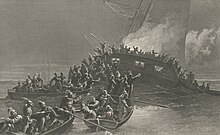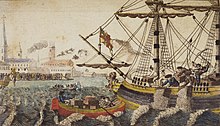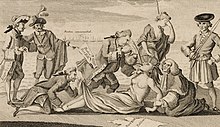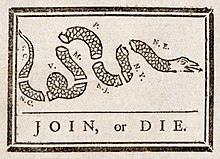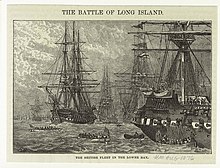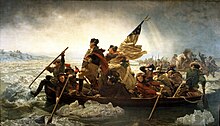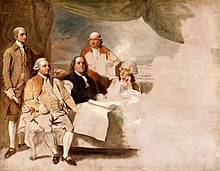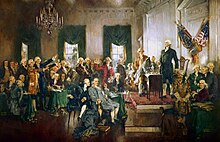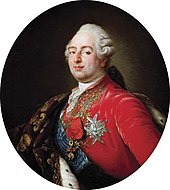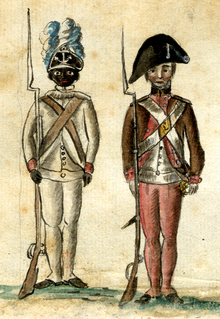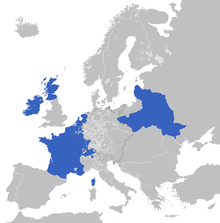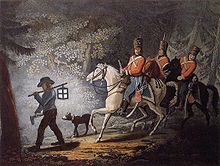American Revolution
Shortly following adoption of the Stamp Act, the Sons of Liberty formed, and began using public demonstrations, boycotts, and threats of violence to ensure that the British tax laws became unenforceable.
Benjamin Franklin appeared before them to make the case for repeal, explaining that the colonies had spent heavily in manpower, money, and blood defending the empire, and that further taxes to pay for those wars were unjust and might bring about a rebellion.
In 1767, the British Parliament passed the Townshend Acts, which placed duties on several staple goods, including paper, glass, and tea, and established a Board of Customs in Boston to more rigorously execute trade regulations.
[citation needed] In June 1772, American patriots, including John Brown, burned a British warship that had been vigorously enforcing unpopular trade regulations, in what became known as the Gaspee Affair.
On December 16, 1773, a group of men, led by Samuel Adams and dressed to evoke the appearance of Indigenous people, boarded the ships of the East India Company and dumped £10,000 worth of tea from their holds (approximately £636,000 in 2008) into Boston Harbor.
King George declared Massachusetts to be in a state of rebellion in February 1775[55] and the British garrison received orders to seize the rebels' weapons and arrest their leaders, leading to the Battles of Lexington and Concord on April 19, 1775.
In March 1776, aided by the fortification of Dorchester Heights with cannons recently captured at Fort Ticonderoga, the Continental Army led by George Washington forced the British to evacuate Boston.
[59] Following the Battle of Bunker Hill in June 1775, the Patriots had control of Massachusetts outside Boston's city limits, and the Loyalists suddenly found themselves on the defensive with no protection from the British army.
Gathered at Pennsylvania State House in Philadelphia, 56 of the nation's Founding Fathers, representing America's Thirteen Colonies, unanimously adopted and issued to King George III the Declaration of Independence, which was drafted largely by Thomas Jefferson and presented by the Committee of Five, which had been charged with its development.
[76] The capture of a British army at Saratoga encouraged the French to formally enter the war in support of Congress, and Benjamin Franklin negotiated a permanent military alliance in early 1778; France thus became the first foreign nation to officially recognize the Declaration of Independence.
Behind them, much of the territory that they had already captured dissolved into a chaotic guerrilla war, fought predominantly between bands of Loyalists and American militia, which negated many of the gains that the British had previously made.
The war revealed the limitations of Britain's fiscal-military state when they discovered that they suddenly faced powerful enemies with no allies, and they were dependent on extended and vulnerable transatlantic lines of communication.
[113] James Madison spearheaded Congressional legislation proposing amendments to the Constitution as assurances to those cautious about federal power, guaranteeing many of the inalienable rights that formed a foundation for the revolution.
[134] Historian Bernard Bailyn argues that the evangelicalism of the era challenged traditional notions of natural hierarchy by preaching that the Bible teaches that all men are equal, so that the true value of a man lies in his moral behavior, not in his class.
[135] Kidd argues that religious disestablishment, belief in God as the source of human rights, and shared convictions about sin, virtue, and divine providence worked together to unite rationalists and evangelicals and thus encouraged a large proportion of Americans to fight for independence from the Empire.
[136] Alan Heimert argues that New Light anti-authoritarianism was essential to furthering democracy in colonial American society, and set the stage for a confrontation with British monarchical and aristocratic rule.
[147] In the words of the British historian George Otto Trevelyan, the King was determined "never to acknowledge the independence of the Americans, and to punish their contumacy by the indefinite prolongation of a war which promised to be eternal.
[156] The United States and France were joined by Spain in 1779 and the Dutch Republic, while Britain had no major allies of its own, except for the Loyalist minority in America and German auxiliaries (i.e. Hessians).
They included a full range of social and economic classes but were unanimous regarding the need to defend the rights of Americans and uphold the principles of republicanism in rejecting monarchy and aristocracy, while emphasizing civic virtue by citizens.
It was widely distributed and often read aloud in taverns, contributing significantly to concurrently spreading the ideas of republicanism and liberalism, bolstering enthusiasm for separation from Great Britain and encouraging recruitment for the Continental Army.
As George III was also the Elector of Hanover, many supported the Loyalist cause and served as allies of the Kingdom of Great Britain; most notably rented auxiliary troops[188] from German states such as the Landgraviate of Hessen-Kassel.
[201] In 1776, Cherokee war parties attacked American Colonists all along the southern Quebec frontier of the uplands throughout the Washington District, North Carolina (now Tennessee) and the Kentucky wilderness area.
[197] In 1778 and 1780, he led 300 Iroquois warriors and 100 white Loyalists in multiple attacks on small frontier settlements in New York and Pennsylvania, killing many settlers and destroying villages, crops, and stores.
The British elites also understood that an all-out attack on one form of property could easily lead to an assault on all boundaries of privilege and social order, as envisioned by radical religious sects in Britain's seventeenth-century civil wars.
[213] Referring to this contradiction, English abolitionist Thomas Day wrote in a 1776 letter that if there be an object truly ridiculous in nature, it is an American patriot, signing resolutions of independency with the one hand, and with the other brandishing a whip over his affrighted slaves.
Historians such as Bernard Bailyn, Gordon Wood, and Edmund Morgan view it as a unique and radical event which produced deep changes and had a profound effect on world affairs, such as an increasing belief in the principles of the Enlightenment.
[233] Some historians and scholars argue that the subsequent wave of independence and revolutionary movements has contributed to the continued expansion of democratic government; 144 countries, representing two-third of the world's population, are full or partially democracies of same form.
[77] On April 3, 1783, Ambassador Extraordinary Gustaf Philip Creutz, representing King Gustav III of Sweden, and Benjamin Franklin, signed a Treaty of Amity and Commerce with the U.S.[77] The Revolution had a strong, immediate influence in Great Britain, Ireland, the Netherlands, and France.
[265] Some migrated to Britain, but the great majority received land and subsidies for resettlement in British colonies in North America, especially Quebec (concentrating in the Eastern Townships), Prince Edward Island, and Nova Scotia.
[271] The United States Bicentennial in 1976 came a year after the American withdrawal from the Vietnam War, and speakers stressed the themes of renewal and rebirth based on a restoration of traditional values.




